Eleventh International Conference on Gastrointestinal, Liver and Urinary Tumors Announces: For the first time... the use of immunotherapy for colon tumors and its superiority over chemotherapy
For the first time... the use of immunotherapy for colon tumors and its superiority over chemotherapy
Studies combining the Ain Shams Research Center and the American MD Anderson Institute for the use of immunotherapies before or after liver tumor surgeries
For the first time, Egyptian guidelines for liver transplantation from a living donor
Lighting the pyramid in blue in solidarity with the early detection of colon and prostate tumors on the sidelines of the conference.
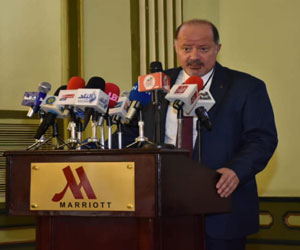 |
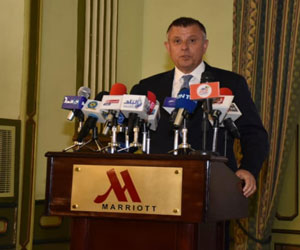 |
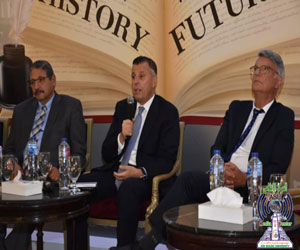 |
||
Drawing the features of treatment plans that aim to cure various types of tumors of the digestive system, liver and urinary system tumors in cooperation between Egyptian and foreign scientists, and announcing the development of the first Egyptian guidelines for liver transplantation, and for the first time new integrated treatment plans that combine different treatment methods applied to patients with tumors Gastrointestinal, liver and urinary system tumors, before or after surgical treatments, to increase the cure rates, which were very weak in those types of tumors, and to announce the use of immunotherapy for the first time in colon tumors as a first line in patients positive for MSI analysis and its superiority over Chemotherapy in this group of patients, and the use of immunotherapy for the first time in kidney tumors after surgical removal in patients with high risk rates, which leads to increased cure rates and reduced possibilities of tumor recurrence, these were some of the most important announced by the Eleventh International Conference on Oncology Gastrointestinal, Liver and Urinary Tract Oncology, which was launched yesterday and will continue for two days under the slogan "Leading the Past and Charting the Future".
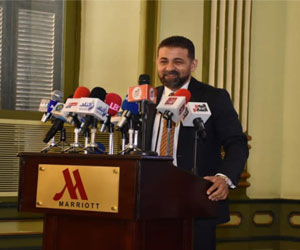 |
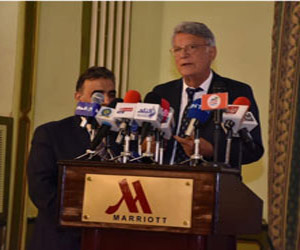 |
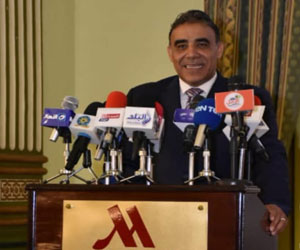 |
||
This came under the auspices of Dr. Khaled Abdel Ghaffar, Minister of Higher Education and Scientific Research and Acting Minister of Health and Population, Dr. Mahmoud El-Metini, President of Ain Shams University, Dr. Ashraf Omar, Dean of Ain Shams Medicine, and Dr. Osama Hetta, Professor of Interventional Radiology, Ain Shams Medicine, one of the presidents of the Eleventh International Conference on Organ Oncology Al-Hadi, Liver and Urology, Dr. Hisham Al-Ghazali, Professor of Oncology, Conference Secretary General, President of the International Society of Oncology, Head of Ain Shams Medical Research Center, and Honorary Presidency of the scientist Dr. Markus Buchler, Head of the Department of Gastrointestinal Oncology, Heidelberg University, Germany, and the largest pancreatic tumor surgeon in the world, and Dr. Heinz Lenz. Professor of Genetics, Molecular Pathways and Gastrointestinal Tumors at the University of Southern California in the United States, in the presence of more than 75 foreign scientists from different countries of the world and with the participation of the President of the American Society for Radiotherapy, Dr. For oncology, Egyptian universities, Egyptian and Arab research centers, and International, 300 scientific lectures, 100 research papers, and 12 workshops are given.
Dr. Mahmoud El-Metini, President of Ain Shams University and Professor of Liver Surgery announced that for the first time on July 22, Egyptian experts in the field of liver transplantation will meet to set Egyptian guidelines for transplanting liver from a living donor, as Egypt is one of the largest countries in the world in this field; Noting that more than 5,000 liver transplant cases have been performed, with success rates comparable to the world's largest.
Dr. Hisham Al-Ghazali explained that this year’s session is considered the most important of all due to the new developments that it bears, as the conference includes, in addition to what was previously announced, the results of studies using radioactive granules to get rid of some liver tumors completely after combining them with immunotherapy to reduce the possibility of the disease returning. Once again for these patients and for the first time in Egypt, guidelines for diagnosing and treating liver tumors will be developed with global participation and the participation of all specialties of oncology, radiotherapy, gastroenterology and interventional radiology, in addition to announcing the use of the surgical robot in prostate surgeries, gastrointestinal surgeries and tumors in Egypt in the presence of pioneers Robotic surgery in the world, led by Dr. Clodabo. The conference will also discuss the use of immunotherapy and the combination of immunotherapy and targeted therapy in liver tumors in the early stages before or after surgeries, and the announcement of a joint scientific protocol between the Ain Shams Medical Research Center and the Liver Tumors Unit at the Institute of MD Anderson in the United States of America, and for the first time, the reasons for the increased incidence of colon tumors in patients are announced Young people and how to avoid and treat this phenomenon and study this phenomenon in eastern and western societies.
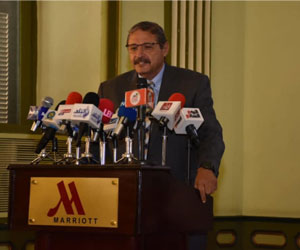 |
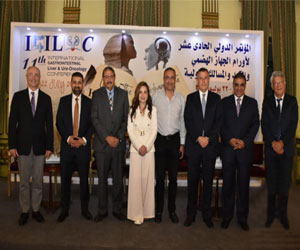 |
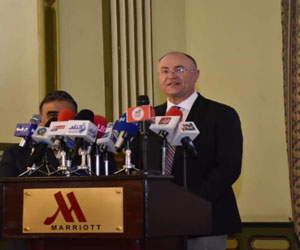 |
||
He added that the conference includes announcing the use of radiotherapy to get rid of some tumors spread within narrow limits (3 to 5 tumors) by combining general treatment and radiotherapy to get rid of these tumors and increase recovery rates, pointing out that on the sidelines of the conference, the pyramid will be illuminated in color. Blue in solidarity with the early detection of colon and prostate tumors.
Representatives of all disciplines from all centers in Egypt will participate in this meeting, and this field will open up many joint researches and contribute to unifying the steps of preparing, conducting and following up liver transplant patients in Egypt and the world.
For his part, Dr. Osama Hetta, Professor of Interventional Radiology, Faculty of Medicine, Ain Shams, and President of the Conference, indicated that the talk in this conference is also about interventional radiology techniques for the treatment of primary and secondary liver tumors without cautery by radiofrequency or microwave and arterial catheter injection of its modern chemical and radiological types, which is used in tumors. The liver bifurcated and extended to the portal vein.
He reported that the announcement of the role of the new interventional radiology, which extended to include the treatment of tumors and benign growths such as benign thyroid hyperplasia and tumors, which are treated by cauterization with thermal frequency as an alternative to surgery while preserving the gland and its functions, as well as benign prostatic hyperplasia, which causes a change in urination habits in men, and uterine fibroids that cause bleeding. For women, they are treated with arterial catheterization without any surgical intervention, in addition to the treatment of malignant tumors.
While Dr. Tariq Osman, Professor of Urology, Faculty of Medicine, Ain Shams University, explained that urological tumor surgery has witnessed a great development in the past few months, whether through drug treatment through new drugs that act on the immune system, and on the scale of biological change in cancer cells, a major leap occurred in Treatment for urinary tract tumors, and for urology, there has been a huge boom using the robot. For the first time in Egypt this year, the surgical robot appeared, and the first place it was used was Ain Shams University, and since its arrival 7 months ago, nearly 60 robotic surgeries have been performed, which is a major qualitative leap in Urology and its surgery because the robot is characterized by extreme accuracy in performing this surgery with an almost zero error rate because the tissue magnification is very large, and the ability to access and show the details of the body with great accuracy and clarity, and thus leads to good results for surgeries, and minor side effects, which led to leaving patients quickly, and the need for blood transfusions has been eliminated because the complications are generally much less than traditional surgeries, and this year the conference is witnessing more than one scientific session to discuss developments in blood transfusion Robot oases and a review of the results of the surgical robot in Egypt through the Ain Shams Center.
He added that the traditional methods for diagnosing urinary tract tumors have become non-existent, and have been replaced by radiological examination such as multispectral magnetic resonance and positron emission scanning, using precise materials to detect carcinogenic cells throughout the body, pointing out the need to launch campaigns for early detection of cancerous tumors in abundance. Prostate cancer is the most common worldwide in males.


.svg)




